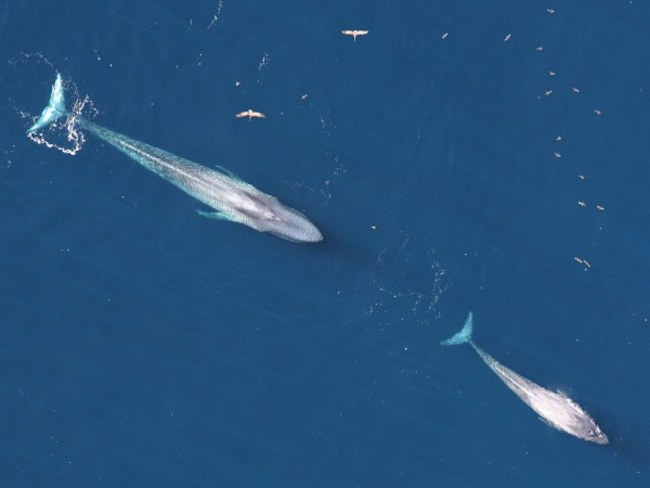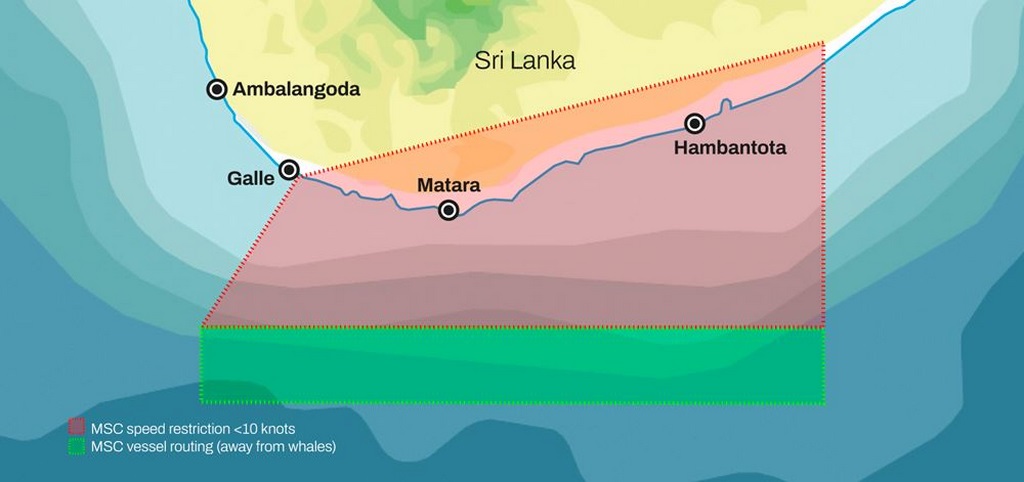
Mediterranean Shipping Company (MSC) has taken a major step to help protect blue whales and other cetaceans living and feeding in the waters off the coast of Sri Lanka by altering shipping lanes to avoid their habitat.
A global leader in container shipping and logistics, MSC began in mid-2022 to voluntarily re-route its vessels passing by Sri Lanka, on a new course that is approximately 15 nautical miles to the south, in line with the advice of scientists and other key actors in the maritime sector.
The decision was based on research surveys completed by the International Fund for Animal Welfare (IFAW), with the World Trade Institute (WTI), Biosphere Foundation, University of Ruhuna (Sri Lanka), and supported by the World Wildlife Fund (WWF).
Westbound ship traffic is now limited to a latitude between 05 30N and 05 35N, and eastbound traffic is limited to a latitude between 05 24N and 05 29N in order to avoid designated cetacean habitats.

Sri Lanka lies in the Indian Ocean, between Asia and Europe, and the port of Colombo is a major transshipment hub for global trade.
The area off its southern coast is one of the busiest shipping lanes in the world and is also inhabited by large populations of whales, meaning that these animals may be at risk of colliding with ships.
Simulations have shown that moving the official shipping lane 15 nautical miles to the south could reduce the strike risk to blue whales by a whopping 95%. However, despite years of advocacy by scientists, the shipping industry and NGOs, the boundaries of the official shipping line have not been reassigned to reduce the risk of ship strikes on cetaceans.
MSC is now taking measures to protect marine wildlife seriously, from adapting shipping service networks to keep away from designated whale breeding and feeding grounds, to reducing vessel speed and re-routing ships to avoid reported marine wildlife populations.
READ ALSO: A New Detection System Could Save Sperm Whales From Ship Strikes
“We believe that the commercial shipping sector has an important role to play in protecting cetaceans, specifically in helping to reduce the risk of ship collisions with whales,” said Stefania Lallai, Vice President Sustainability at MSC.
“MSC is proud to rank at or near the top of whale safety shipping rankings. However, we are not at all complacent. We believe that raising awareness of these issues and encouraging collaboration between industry, scientific bodies, civil society and governments is essential as we strive collectively to do more to minimize the risk of ship strikes.”
CHECK OUT: Fin Whales Are Feeding In Huge Numbers in Antarctica for First Time in 45 Years – WATCH
In Sri Lanka specifically, the liner shipping industry led by the World Shipping Council, of which MSC is a member, has advocated to create a new official marine traffic scheme that is fully separated from the blue whale feeding area.
It is hoped that this will soon become a reality, so all large-scale commercial marine traffic moves to the more southerly zone that MSC ships are now guided to follow. In the meantime, MSC urges all other ship operators to consider choosing a more southerly route past Sri Lanka, to significantly reduce the possibility of whale strikes.
SHARE This Example Of Good Corporate Governance With Your Friends…



















